Best Internet Speed Tests of 2026
Find out which internet tests are the most reliable measures of your internet connection.

- Internet speed tests are essential to ensure you’re experiencing speeds as advertised by your internet service provider (ISP).
- Measurement Lab is our top pick for the best overall speed test due to its history, open platform, and mission for open data.
- While some internet providers offer their own speed tests, they probably aren’t the most reliable option.
Slow connection speeds, long buffer times, and even internet throttling are some of the worst challenges to experience when using the internet. When these scenarios occur, you’ll want to run an internet speed test to see if your connection is affected by issues like peak traffic hours.
Even if your internet runs smoothly, internet speed tests can help confirm your connection speed is as advertised on your internet plan. Picking the best internet speed test, however, can be challenging. You’ll want a speed test that is reliable, presenting unbiased and accurate data that you can reference when diagnosing the cause of your slow internet. We tested out some of the most popular internet speed tests and put together our top picks based on accuracy, reliability, history, and available features.
Why You Might Need to Do an Internet Speed Test
So why perform an internet speed test? Maybe you paid for gigabit internet, but your connection seems slower than usual. Or maybe your household has heavy internet users, resulting in long buffer times and requiring taking turns to stream content. Whatever the reason, performing regular internet speed tests can tell you if and when you’re experiencing lag, latency, or other connection issues. Here are some signs that indicate you need to do an internet speed test:
- Your streaming services are constantly buffering. There’s nothing worse than watching your favorite show, and it starts buffering right as the plot gets good. When that happens, you might need to test your internet speeds to see if it’s the streaming service or your internet.
- You’re experiencing lag in your online games. If you find yourself getting disconnected in the middle of an online match or notice lag during your games, you may need to do an internet speed test to check your latency or ping.
- Downloads are taking longer than usual. If files that used to take just a few seconds are starting to take minutes, you might need an internet speed test to ensure you’re getting your full download speed.
- Online video or voice calls disconnect frequently. Video calls require consistent download and upload speeds as well as low latency. Dropped calls are an indication of poor speed quality.
- Web pages are loading slowly. Stuck on the loading screen of a web browser? If you’re not already downloading something in the background, you could be experiencing sluggish internet speeds.
Measurement Lab (BroadbandNow Top Pick)
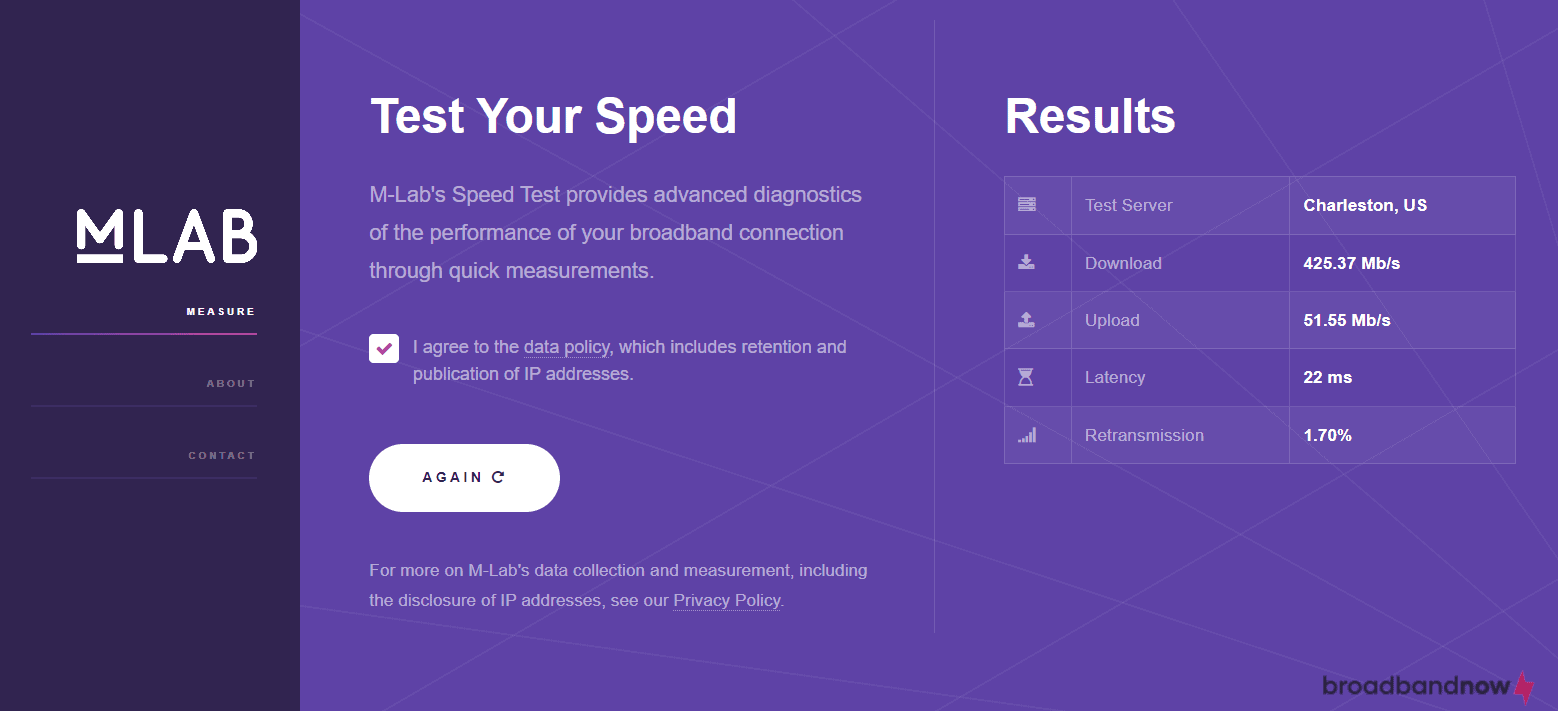
Measurement Lab, also known colloquially as M-Lab, is an open-source internet speed test software that aims to provide valuable and verifiable information about a user’s internet speed. It’s more than just our top pick — BroadbandNow’s speed test utilizes M-Lab technology because it has a history of reporting valid data to consumers. Google also uses M-Lab in its embedded search engine speed test (so you know you’re in good company). Unlike most internet speed tests, M-Lab provides its data to the public, allowing outside collaborators to collect network measurement information for their studies or other research purposes.
M-Lab even hires a dedicated staff of “maintainers” as well as an experiment review committee, to keep its database updated and ensure the information provided by M-Lab is consistently valid. This committee includes M-Lab founder Vint Cerf — aka, “the father of the internet.” Supporting research projects and partners like Google and Internet Society as well as contributors from both public and private institutions, make M-Lab a well-rounded project trusted by the best in the business.
Why you should pick Measurement Lab
- Accurate and quick internet speed tests
- Open-source data available for the public
- Trusted by academic researchers, educational institutions, and other public entities
Ookla (Most Popular Speed Test)
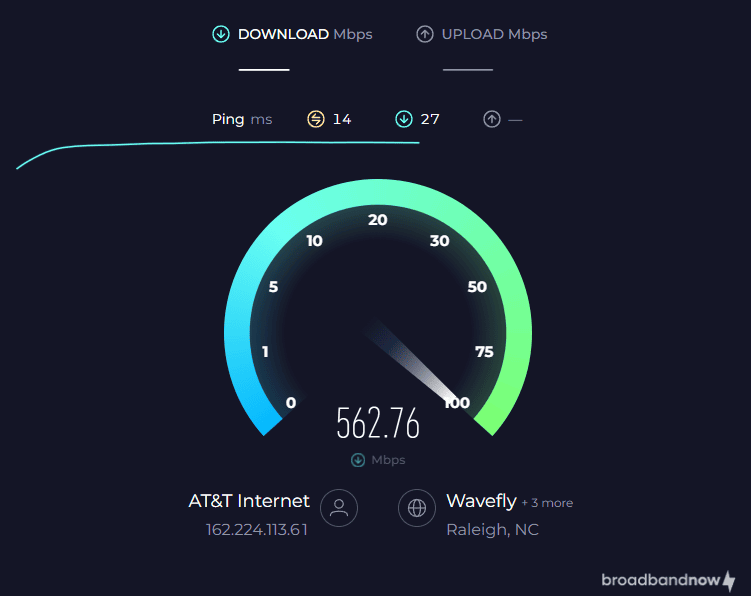
Considered one of the most well-known internet speed tests, millions of people utilize Ookla to test their internet performance regularly. Along with download and upload speeds, Ookla provides information on connection type, latency, and ping — critical factors for internet-heavy tasks like online gaming and streaming. Data analysis, market reports, and a Speedtest Global Index are additional perks on Ookla’s main website. It also offers its speed test via native apps, so you can perform speed tests on multiple operating systems using your phone, tablet, or other electronic device.
Why you should pick Ookla
- Provides extensive information on internet connection upon testing
- Insights and analysis offer information on global internet speeds
- Ookla 5G Map tracks and detects 5G rollouts globally
Fast.com (Best Streaming Speed Test)
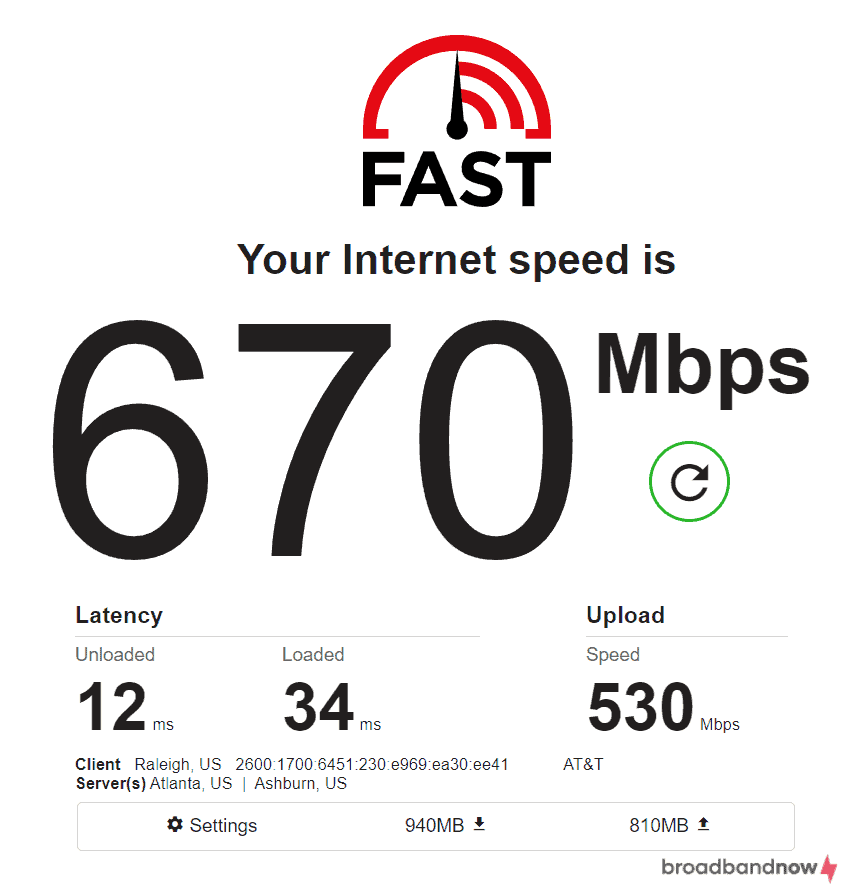
Simple, straightforward, and to the point, Fast.com starts testing your internet speeds the moment you click on its site. We liked that there were no frills with this test. You just go to the URL and immediately get information on download speeds, upload speeds, and latency.
Streamers will be happy to know that Netflix endorses Fast.com, so it’s one of the only sponsored speed tests to test if you can watch your favorite shows and movies without the long buffering times. If you’re planning a marathon watch party, Fast.com could be the best internet speed test to ensure you won’t encounter a moment of buffering. That said, non-4K streaming doesn’t really utilize a ton of bandwidth, so most people will find their internet connection far outweighs the minimal necessities for Netflix.
Why you should pick Fast.com
- Simple website UI
- Endorsed by Netflix
- Ideal for streamers to test their connection speed
Xfinity Speed Test (Best ISP Speed Test)
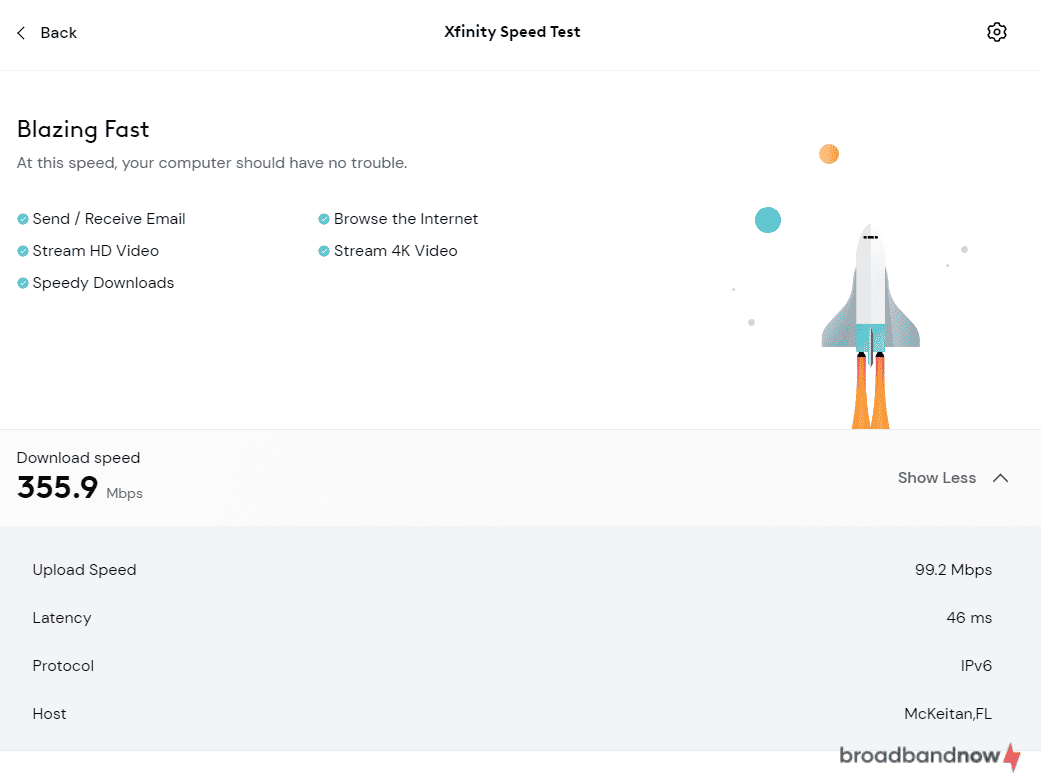
Some ISPs offer speed tests for their customers, and Xfinity is one such provider. We liked how Xfinity’s speed test shows your download and upload speeds and tells you what tasks you can do with your internet speeds. Despite what the name implies, you don’t even need to be an Xfinity customer to use its internet test.
However, we still need to be convinced of the validity of ISP-based internet speed tests, especially as we found our speeds on the Xfinity website to be slightly less than all the other websites and applications we tested, such as M-Lab and Ookla. That said, while ISPs could certainly offer slow speed tests to encourage plan upgrades, we found Xfinity’s speed test offering to be within the margin of error for this type of application. We encourage you to try a few different speed tests and see for yourself, but Xfinity’s speed test was the best one we saw from an internet provider.
Why you should pick the Xfinity Speed Test
- Xfinity consumers can verify their own internet speeds
- Provides a list of online tasks you can do with your tested speed
- Test the internet signal to your home or device
FCC Speed Test App (Best Mobile Speed Test)
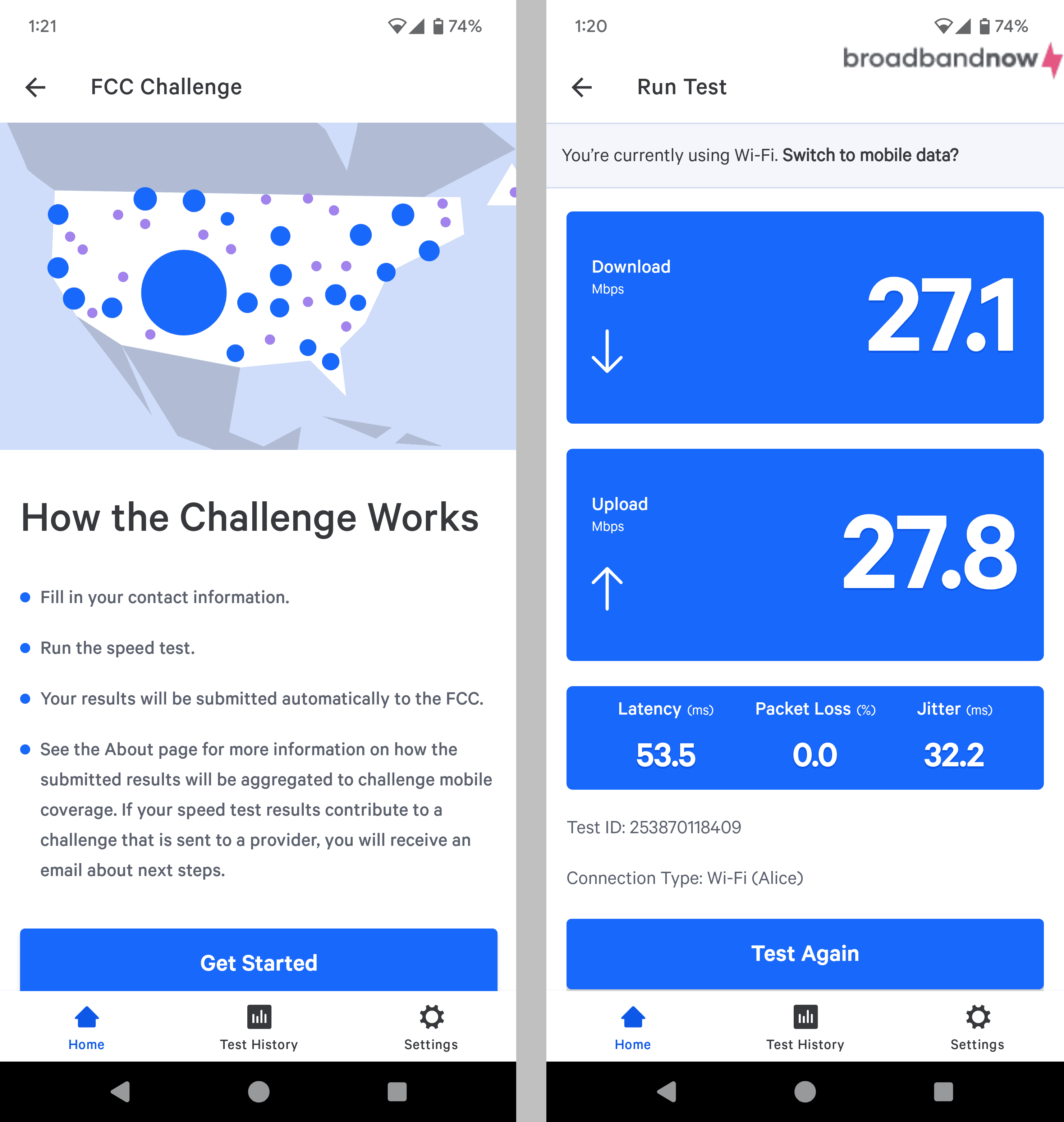
Backed by a connectivity initiative from the Biden Administration, the FCC Speed Test App allows you to check your internet performance on any platform, including your mobile device. This test provides similar information to other speed test apps – download and upload speeds, latency, packet loss, and jitter.
While there are countless speed test apps out there, we liked how the FCC Speed Test app comes with a built-in ability for people to challenge coverage reports and speeds from different ISPs. This challenge isn’t a competition for your internet. Instead, these tests help improve the FCC’s National Broadband Map and offer a reference to confirm or dispute an ISP’s internet speed or coverage. You can even toggle on a setting in the app to allow it to test your internet intermittently throughout the day to ensure you’re getting consistent speeds and coverage.
Why you should pick the FCC Speed Test App
- Backed by the Biden Administration as an initiative for connectivity
- Detailed reports of internet speeds
- Challenge tests to dispute ISP advertised speeds
How to Interpret Your Speed Test Results

Regardless of which internet speed test you choose, all of them will test two major parts of speed – download speeds and upload speeds. They may also measure other characteristics of your internet, such as latency and packet loss. When reading your speed test results, take note of these factors:
- Download speeds: The speed at which your devices receive data online, including images, text, video, and other media. It’s typically measured in megabits per second (Mbps).
- Upload speeds: The speed at which your devices send data online, including images, text, video, and other media. It’s typically measured in Mbps, similar to download speeds.
- Latency: When data goes from one place to another, it is transmitted in small data packets rather than large packets. Latency is the time it takes for a packet to travel from one point to another. It’s usually measured in milliseconds (ms).
- Jitter: If latency is the time it takes for data to reach its destination, jitter is the change in time between when a packet is sent and when it’s received. It’s usually measured in ms, similar to latency.
- Packet loss: As the name states, packet loss is when one or more packets of data are not transferred successfully, either because of interference, software bugs, network congestion, or other internet issues. It’s typically measured as a percentage of packets successfully sent but not received.
- Retransmission: Also known as TCP retransmission, this term refers to the action of resending packets of data that were either lost or corrupted. It’s often measured as a rate, with any value of 2% or higher affecting the user’s experience.
Tips for Testing Your Internet Speeds
Running internet tests can only help you figure out your current internet speeds. For the most accurate reading, you’ll want to keep a few tips in mind before clicking that “start” button:
- Finish all downloads, uploads, and streaming services. Testing your internet while downloading files or running streaming services can result in slower internet speeds and give you a false reading. Complete or pause all your tasks to get a more accurate speed test result.
- Close all running applications. If any programs are running in the background, close them all before running any internet speed test. You can typically see what applications are running through your task manager.
- Perform internet tests at different times of the day. If you experience slower internet speeds at certain times of the day, you might be using your internet during peak traffic hours. Test your internet during the morning, afternoon, evening, and nighttime to see when you may get faster or slower internet speeds. We recommend testing over a few days to gather the most precise readings.
- Experiment with testing your internet in various locations. Test your internet near your router, and then test it in different spots around your household. If you’re on a computer, try connecting to your router via an Ethernet cable before testing to see if you’re getting speeds as advertised on your internet plan.
- Restart your PC and router. Yes, turning your PC and router off and back on is an excellent way to get a precise and accurate internet speed test reading. Like other electronic devices, restarting devices helps clear the cache and makes it easier to find better internet signals.
Frequently Asked Questions About Internet Speed Tests
What is a good internet speed?
The FCC defines high-speed internet as any connection with a minimum speed of 25 Mbps, which is okay for basic online activities, such as sending/receiving emails, browsing the internet, and video streaming. However, most people will need faster internet speeds for more devices or bandwidth-heavy tasks, like online gaming, streaming in 4K, or downloading and transferring large files. We recommend a minimum internet download speed of 100 Mbps for most users.
What causes slow internet?
Several factors can cause slow internet, including long download queues or transferring large files. You may also experience slow internet during peak traffic hours when several users are on the same network.
What internet providers offer their own speed tests?
Internet providers like Xfinity, Spectrum, and even Google offer their own speed tests. These tests are not exclusive to customers who use these specific ISPs, and anyone can use these speed tests to measure their internet’s performance and compare it with other speed tests available online.
What if my internet speed is slower than advertised?
Check the devices around your household to see if any of them are performing bandwidth-heavy tasks, such as downloading large files. If this isn’t the case, contact your internet provider’s customer support to see if there is a way to resolve your connection issues.
How do I know if my speed test results are accurate?
Some internet speed tests may be more accurate than others. If you’ve used one and are unsure about its validity, test your internet against other internet speed tests and compare results. Note that you’ll want to test them around the same time, as different times of day might have different traffic levels and could skew your speed test results.